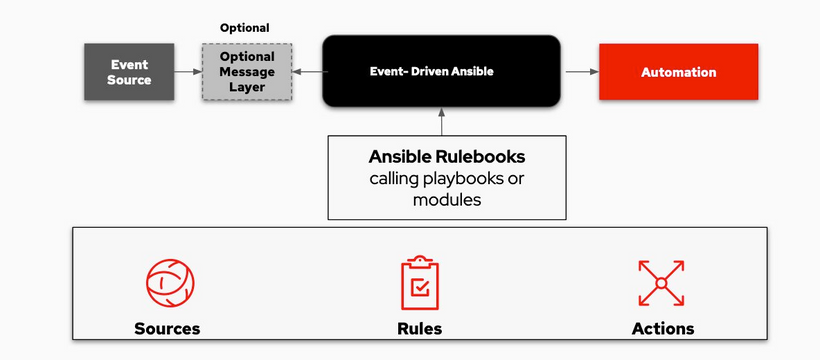EVE-NG Linux VM SSH troubleshooting
September 20, 2025
Event-Driven Ansible
Event-Driven Ansible (EDA) allows the execution of an Ansible playbook to be triggered by a specific event. This capability exponentially i
Event-Driven Ansible (EDA) allows the execution of an Ansible playbook to be triggered by a specific event.
This capability exponentially increases Ansible’s potential, transforming it into a tool for automating processes based on specific events, such as troubleshooting, threat intelligence, IoCs, data collection, and general analysis. These activities can be partially or fully automated.
Many security vendors have released specific modules. For instance, Palo Alto Networks has developed a plugin for analyzing firewall logs and triggering initial automated diagnostics in case of SSL decryption errors.
Rulebook
An Ansible Rulebook is a set of rules that EDA uses to execute specific actions. A rulebook can:
The first part of a rulebook defines one or more event sources to be monitored. EDA uses Event Source Plugins to monitor these sources.
Event Source Plugins
Event Source Plugins can be classified into three types:
- Event Bus Plugins: Listens to a stream of events from a source where the connection is established by the plugin itself (e.g., Kafka and AWS SQS Queue plugins).
- Scraper Plugins: Connects to a source and scrapes data from it, usually at predefined intervals (e.g., URL Check and Watchdog plugins).
- Callback Plugins: Provides a callback endpoint that the event source can call when data is available (e.g., Webhook and Alertmanager plugins). Callback plugins are the least reliable as they depend on the event source to call the endpoint and are highly susceptible to data loss.
When an Event Source Plugin detects an event, EDA uses rules to determine which action to take. If an event matches a rule, EDA executes the specified actions. Actions can include:
- run_playbook: Executes an existing Ansible Playbook.
- run_job_template: Runs a job template via the Ansible Automation Platform.
- run_module: Runs a specific Ansible module for targeted execution without running an entire playbook.
- post_event: Posts an event to a running ruleset, allowing action results to feed back into EDA.
- set_fact: Stores specific event data to be reused within EDA.
- debug: Outputs debug information, similar to the debug module in Ansible Playbooks.
Continue reading the post on Patreon .















